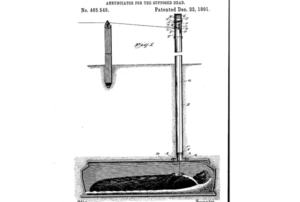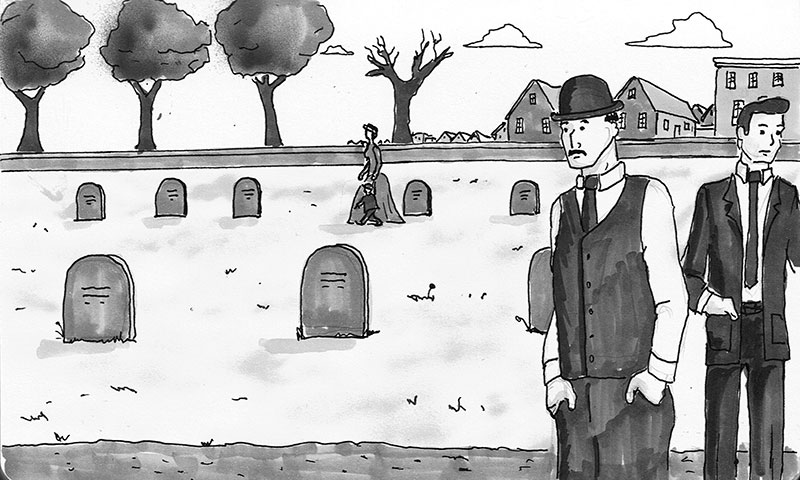We are praying now for the repose of his soul. Hoping you’re well and not in hell. Nice change of air. Out of the fryingpan of life into the fire of purgatory.
Does he ever think of the hole waiting for himself? They say you do when you shiver in the sun. Someone walking over it. Callboy’s warning. Near you. Mine over there towards Finglas, the plot I bought. Mamma, poor mamma, and little Rudy.
The gravediggers took up their spades and flung heavy clods of clay in on the coffin. Mr Bloom turned away his face. And if he was alive all the time? Whew! By jingo, that would be awful! No, no: he is dead, of course. Of course he is dead. Monday he died. They ought to have some law to pierce the heart and make sure or an electric clock or a telephone in the coffin and some kind of a canvas airhole. Flag of distress. Three days. Rather long to keep them in summer. Just as well to get shut of them as soon as you are sure there’s no.
The clay fell softer. Begin to be forgotten. Out of sight, out of mind.
The caretaker moved away a few paces and put on his hat. Had enough of it. The mourners took heart of grace, one by one, covering themselves without show. Mr Bloom put on his hat and saw the portly figure make its way deftly through the maze of graves. Quietly, sure of his ground, he traversed the dismal fields.
Hynes jotting down something in his notebook. Ah, the names. But he knows them all. No: coming to me.
—I am just taking the names, Hynes said below his breath. What is your christian name? I’m not sure.
—L, Mr Bloom said. Leopold. And you might put down M’Coy’s name too. He asked me to.
—Charley, Hynes said writing. I know. He was on the Freeman once.
So he was before he got the job in the morgue under Louis Byrne. Good idea a postmortem for doctors. Find out what they imagine they know. He died of a Tuesday. Got the run. Levanted with the cash of a few ads. Charley, you’re my darling. That was why he asked me to. O well, does no harm. I saw to that, M’Coy. Thanks, old chap: much obliged. Leave him under an obligation: costs nothing.
annotation:
 In the text we see Bloom express fear of being buried alive. Apparently throughout history that fear is prevalent, peaking during the cholera epidemics of the 18th and 19th centuries. Works of fiction by Poe like The Fall of the House of Usher and The Cask of Amontillado, and The Premature Burial would have been well known at the time and Bloom probably would have read them. Fear of being buried alive lead to the creation of coffins in which a prematurely buried occupant could sound an alarm. (source) I found an article about other inventions dealing with being buried alive, very interesting and worth a read (source)
In the text we see Bloom express fear of being buried alive. Apparently throughout history that fear is prevalent, peaking during the cholera epidemics of the 18th and 19th centuries. Works of fiction by Poe like The Fall of the House of Usher and The Cask of Amontillado, and The Premature Burial would have been well known at the time and Bloom probably would have read them. Fear of being buried alive lead to the creation of coffins in which a prematurely buried occupant could sound an alarm. (source) I found an article about other inventions dealing with being buried alive, very interesting and worth a read (source)
I’m not sure but it seems that Bloom thinks M’Coy made off with money Dignam may have had on him when he died.

